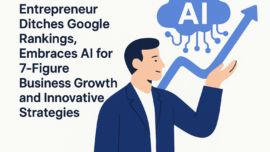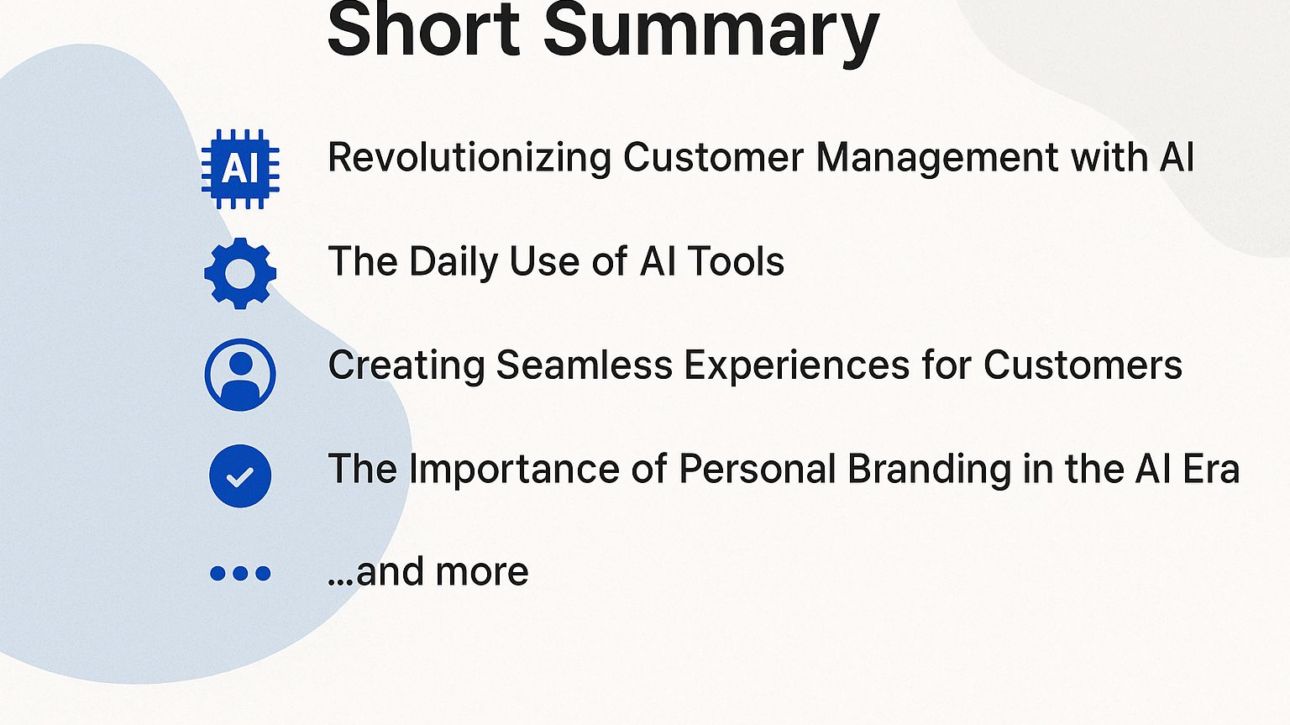In an era where traditional SEO methods are becoming obsolete, entrepreneur Kyle Ray has shifted his focus to artificial intelligence (AI) to achieve remarkable growth in his window cleaning business. By abandoning Google rankings and leveraging AI tools, Ray is poised for unprecedented revenue success.
Short Summary:
- Kyle Ray trades traditional SEO for AI-driven strategies to grow his window cleaning business.
- He predicts over $1 million in revenue for 2025, thanks to innovative AI tools.
- Experts advise entrepreneurs on managing their online reputation to thrive in the AI age.
As Kyle Ray transitioned from waiting tables to leading a successful window cleaning service, he discovered the power of search engine optimization (SEO). Initially, in 2013, Ray utilized SEO techniques that helped Geek Window Cleaning reach the top spot for “window cleaning Houston.” However, fast forward to today, and Ray finds himself pivoting away from traditional methods. He points out that “search is going to a zero click so fast,” which has motivated him to abandon the reliance on Google rankings altogether.
“If you Google something, Gemini tells you whatever the answer is right there. You don’t even scroll down the page to see what’s there.” – Kyle Ray
Despite achieving six-figure revenue in 2024, Ray anticipates surpassing the million-dollar mark in 2025, largely due to embracing AI technologies. “We use software and AI as much as possible when it makes sense,” he remarked, highlighting a diverse tech stack comprising tools like ServiceMonster, ChatGPT, and Calendly.
Revolutionizing Customer Management with AI
One of the first steps Ray took was integrating ServiceMonster into his operations for customer management. The shift from using carbon copy paper for tracking customer engagements to an efficient CRM system has made it easier to manage a growing clientele across Houston and Austin. With ServiceMonster, Ray can quickly access detailed account histories, enhancing customer service by remembering even minute details like a client’s pet’s name.
“It was in a folder and you’re always like, ‘What happens if my office catches fire and I lose all this data?'” – Kyle Ray
The Daily Use of AI Tools
Another pivotal tool in Ray’s journey is ChatGPT. “I use ChatGPT every day to do anything from feeding it Geek’s P&L and asking how I can expand margins,” he says. This AI has become his quiet partner, enabling him to receive insights and recommendations without needing a full executive team. Ray expresses that with ChatGPT, he’s effectively employing an “AI CFO” and “AI COO” in his business.
“It’s just me. I don’t have a CFO or a CEO or a COO — I’m wearing all those hats — but I can create ones in ChatGPT.” – Kyle Ray
In addition, AI-driven tools like Chiirp and ZyraTalk enhance customer communications. Ray emphasizes the importance of ensuring customer calls are answered promptly. With Chiirp managing text communications and ZyraTalk handling voice interactions, Ray can offer client support without needing an expansive customer service team.
Creating Seamless Experiences for Customers
Tools like PriceGuide.ai and Calendly have facilitated a frictionless customer experience. Clients can now navigate the entire process, from receiving an estimate to scheduling a service, all without a single conversation with a human representative. “You can go from start to finish without talking to anybody,” he notes, illustrating the efficiency AI brings to his operations.
“Whatever business you’re in, if you’re not playing the AI game, then you’re going to get left in the dust in a couple of years.” – Kyle Ray
The Importance of Personal Branding in the AI Era
The transition to AI isn’t merely about incorporating new tools; it also highlights the critical need for personal branding in today’s digital age. Jason Barnard, CEO of Kalicube, emphasizes that “your personal brand is what Google and AI say about you when you’re not in the room.” His new book, Entrepreneurs Winning the Game in Google and AI With Their Personal Brand, serves as a guide for business owners to shape their digital identities effectively.
Barnard explains how entrepreneurs can leverage platforms like Kalicube Pro, which utilizes data points to enhance how they appear across AI platforms. “This is algorithmic reputation engineering, and it’s now essential for anyone doing business in the AI age,” he adds, debunking the myth that this process is synonymous with traditional SEO.
The Changing Landscape of AI in Business
As AI continues to evolve, entrepreneurs who readjust their strategies to harness it can witness transformative results. For example, businesses preparing for an exit can use AI tools to boost operational efficiency, draw in potential buyers, and showcase their company’s value. Effective implementation can lead to an increase in revenue per employee, net margins, and overall operational capacity.
“Potential buyers will want to see these metrics over time to judge whether they’ve improved and are likely to continue improving.” – Industry Experts
This necessity for strategic AI implementation resonates throughout various business sectors, especially for small and medium-sized enterprises (SMEs) that face stiff competition. Tasks such as client onboarding, research, and marketing functions are natural fits for AI integration, reducing overhead costs while scaling effectively.
Successful AI Integration Leads to Results
Recent surveys indicate that a significant portion of businesses already utilizing AI has recognized its benefits. The majority of leaders in a recent Google Cloud report indicated that AI tools enhanced marketing effectiveness, customer experience, and even security frameworks. Notably, 55% of senior leaders used AI in marketing, finding it crucial for data analysis and content production.
Moreover, these findings suggest that AI has the potential to increase employee productivity, with close to 70% of executives reporting that their workforce has become more efficient since integrating AI solutions into their business practices.
The Next Steps for Entrepreneurs
Ray’s journey illustrates that if entrepreneurs only use AI for limited tasks, they might be missing out on untapped growth potential. Tools like Google AI’s Realtime Feedback can help businesses audit their online presence, while automated systems can streamline marketing processes significantly.
“You don’t have to eliminate jobs, but you can upgrade the quality of the projects you assign to your existing teams and keep them engaged and excited.” – Industry Experts
Ultimately, a long-term approach to AI is vital. Entrepreneurs should not rush to implement AI without first understanding their unique business needs. By strategically identifying where AI can make the most impact, businesses will not only survive but thrive in the competitive landscape.
As Ray succinctly puts it, “money loves speed.” The faster businesses can adapt to AI and understand how to leverage it effectively, the more they can grow and connect with their target market. In the ever-evolving world of entrepreneurship, adaptability is key, and AI has undoubtedly become the vehicle driving that change.
Entrepreneurs like Kyle Ray are setting the precedent, showcasing that traditional avenues like SEO may no longer suffice as the landscape evolves. Embedding AI into operational frameworks isn’t just a trend—it’s becoming an essential part of building and sustaining a successful business. Whether through bookkeeping, marketing strategies, or customer engagement, AI offers transformative potential that every entrepreneur should embrace.
For continuing insights and tools to navigate the AI landscape, check out Autoblogging.ai, where we focus on providing tools that blend AI and SEO for the modern entrepreneur!
Do you need SEO Optimized AI Articles?
Autoblogging.ai is built by SEOs, for SEOs!
Get 30 article credits!



